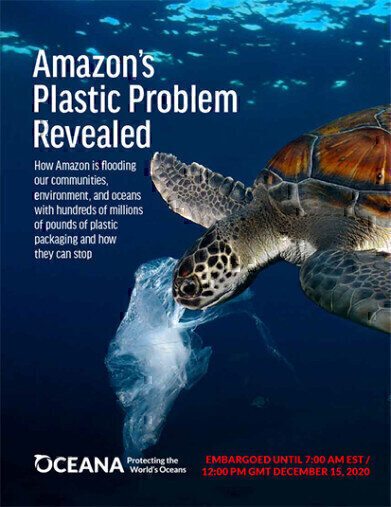Water/Wastewater
Amazon Generated More Than 465 Million Pounds of Plastic Packaging Waste in 2019
Dec 15 2020
Oceana has today released a report – based on an analysis of e-commerce packaging data – that found Amazon generated 465 million pounds of plastic packaging waste last year. This is comprised of the air pillows, bubble wrap, and other plastic packaging items added to the approximately 7 billion Amazon packages, delivered in 2019, according to news accounts.[1] The report found that Amazon’s estimated plastic packaging waste, in the form of air pillows alone, would circle the Earth more than 500 times.
The study also, by combining the e-commerce packaging data with findings from a recent study published in Science[2], estimates that up to 22.44 million pounds of Amazon’s plastic packaging waste entered and polluted the world’s freshwater and marine ecosystems in 2019, the equivalent of dumping a delivery van payload of plastic into the oceans every 70 minutes.
“The amount of plastic waste generated by the company is staggering and growing at a frightening rate,” noted Oceana’s Senior Vice President, Matt Littlejohn. “Our study found that the plastic packaging and waste generated by Amazon’s packages is mostly destined, not for recycling, but for the landfill, the incinerator or the environment including, unfortunately, our waterways and sea, where plastic can harm marine life. It’s time for Amazon to listen to its customers, who, according to recent surveys want plastic-free alternatives, and make real commitments to reduce its plastic footprint.”
Plastic is a major source of pollution and is devastating the world’s oceans. Recent studies estimated that 90% of all seabirds[3] and more than half of all sea turtles – 52 %[4] – have ingested plastic. Sea turtles and other ocean animals mistake the kind of plastic used by Amazon as food which can ultimately prove fatal. Eighty-eight percent of animals found to have swallowed or have been entangled in plastic, according to recent Oceana study, were species listed as endangered or threatened with extinction under the Endangered Species Act.[5] Scientific reports have estimated that only 9% of all plastic ever produced has been recycled and 91% has ended up in landfills, incinerated, or in the environment, including the oceans.[6] The rapidly growing plastic pollution crisis needs to be solved by leaders like Amazon taking steps to reduce plastics, rather than making empty claims about recycling.
The report discloses that the type of plastic often used in packaging by Amazon, referred to as plastic film, is effectively not recycled, despite the company’s claims of recyclability. Most municipal curbside recycling programs in the United Kingdom, Canada, and the United States do not accept this kind of plastic. According to studies, only 4% of residential polyethylene plastic film in the United States was recycled as of 2014[7].
The report also found that:
- Amazon customers overwhelmingly want the company to reduce plastic packaging. Oceana surveyed more than 5,000 Amazon customers in the UK, Canada, and the U.S. in 2020 and found that 86% were concerned about plastic pollution and its impact on the oceans; 92% were upset that plastic recycling does not work; and 87% wanted Amazon and other major online retailers to offer plastic-free packaging choices at checkout. More than 660,000 customers and others have signed a petition calling on the company to offer plastic-free choices at Change.org/Plastic Free Choice.
- Unlike other companies seeking to move away from plastic, Amazon appears to be prioritizing the increased use of “flexible packaging” made of plastic. It has stated it uses flexible packaging to help protect the climate and environment[8] but has not publicly disclosed the data underlying this claim or its plastic footprint. Amazon has already shown it can rapidly reduce plastic packaging on a very large scale. After India passed a law to fight plastic pollution, Amazon eliminated plastic packaging from fulfillment centers in India[9] and has introduced a paper-based lightweight mailer that it reports has been used 100 million times.[10] Amazon has failed to apply these clear steps forward on a company-wide level to solve its plastic problem.
- Amazon’s plastic waste and pollution footprint is expected to drastically increase, given analysts’ recent estimates that the company sales will increase by more than a third in 2020.[11]
To access the full Oceana report, please click here. To find out about Oceana’s campaign to reduce plastics, click here.
_________________________________________________________________________
[1] Amazon announced that it delivered 3.5 billion packages through its own delivery systems in 2019. Amazon (2019) Amazon spokespeople were quoted– in subsequent stories in Vox, US News and other outlets - that this represented “approximately half” of the company’s global shipping volume (and the rest was shipped through other carriers, like UPS).
[2]
[3] Kühn S and van Franeker JA (2020) Quantitative overview of marine debris ingested by marine megafauna. Marine Pollution Bulletin 151: 110858. doi: 10.1016/j.marpolbul.2019.110858
[4] doi: 10.1038/s41598-018-30038-z. Available: https://www.ncbi.nlm.nih.gov/pmc/articles/PMC6137038/. Accessed Sep 20, 2020.
[5] After surveying dozens of government agencies, organizations and institutions that collect data on the impact of plastic on marine animals, Oceana found evidence of nearly 1,800 animals from 40 different species swallowing or becoming entangled in plastic since 2009. Of those, a staggering 88% of these 1800 animals were species listed as endangered or threatened with extinction under the Endangered Species Act. https://usa.oceana.org/publications/reports/choked-strangled-drowned-plastics-crisis-unfolding-our-oceans
[6] https://advances.sciencemag.org/content/3/7/e1700782#:~:text=Of%20this%2C%20approximately%20800%20Mt,2).
[7] RSE USA (2017) The Closed Loop Foundation. Film Recycling Investment Report, pages 16- 17 and Figure 6). Available: https://www.closedlooppartners.com/foundation-articles/investment-opportunities-in-film-plastic-recycling/. Accessed: Sep 20, 2020.
[8] Houchens K (2020) Amazon: Addressing the challenges of e-commerce. Packaging Europe. 10 March 2020. Available https://packagingeurope.com/amazon-addressing-the-challenges-of-e-commerce/. Accessed Sep 20, 2020
[9]Accessed Sep 20, 2020.
[10] https://www.aboutamazon.com/news/sustainability/the-big-ideas-and-tiny-details-behind-amazons-new-recyclable-mailer
[11] https://finance.yahoo.com/quote/AMZN/analysis
Events
IWA World Water Congress & Exhibition
Aug 11 2024 Toronto, Canada
Aug 25 2024 Stockholm, Sweden and online
Sep 03 2024 Mexico City, Mexico
Sep 03 2024 Mexico City, Mexico
Sep 03 2024 San Diego, CA, USA



..jpg)









